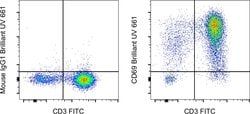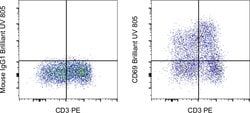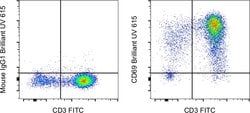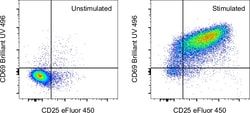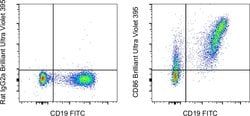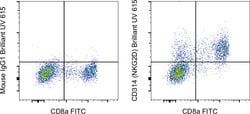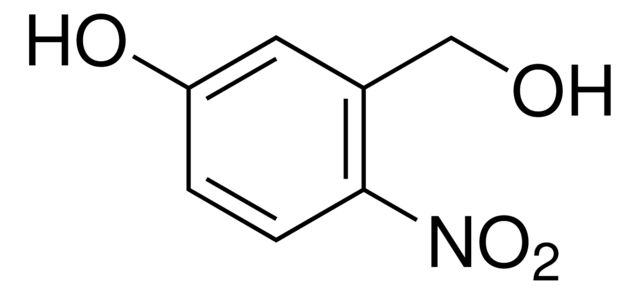CD69 Monoclonal Antibody (FN50), Brilliant Ultra Violet™ 615, eBioscience™, Invitrogen™
Manufacturer: Fischer Scientific
Select a Size
| Pack Size | SKU | Availability | Price |
|---|---|---|---|
| Each of 1 | 366-0699-42-Each-of-1 | In Stock | ₹ 35,867.00 |
366-0699-42 - Each of 1
In Stock
Quantity
1
Base Price: ₹ 35,867.00
GST (18%): ₹ 6,456.06
Total Price: ₹ 42,323.06
Antigen
CD69
Classification
Monoclonal
Concentration
5 μL/Test
Formulation
PBS with BSA and 0.09% sodium azide; pH 7.2
Gene Accession No.
Q07108
Gene Symbols
CD69
Purification Method
Affinity chromatography
Regulatory Status
RUO
Gene ID (Entrez)
969
Content And Storage
4° C, store in dark, DO NOT FREEZE!
Form
Liquid
Applications
Flow Cytometry
Clone
FN50
Conjugate
Brilliant Ultraviolet 615
Gene
CD69
Gene Alias
5830438K24Rik; Activation inducer molecule; activation inducer molecule (AIM/CD69); AI452015; AIM; BL-AC/P26; CD69; CD69 antigen; CD69 antigen (p60, early T-cell activation antigen); CD69 molecule; CLEC2C; C-type lectin domain family 2 member C; C-type lectin domain family 2, member C; EA1; early activation antigen CD69; early lymphocyte activation antigen; early T-cell activation antigen p60; GP32/28; leukocyte surface antigen Leu-23; MLR-3; VEA; Very Early Activation Antigen
Host Species
Mouse
Quantity
100 Tests
Primary or Secondary
Primary
Target Species
Human
Product Type
Antibody
Isotype
IgG1 κ
Description
- CD69 (AIM, Active Inducer Molecule) is a gp28/34 disulfide bonded homodimer with a molecular weight of 60 kDa under non-reducing conditions
- CD69 contains one or two N linked oligosacaride and the molecule is present on activated platelets
- In normal peripheral blood a variable percentage of cells express the CD69 antigen, and it is involved in lymphocyte signal transduction
- Expression CD69 is induced upon activation of T lymphocytes, and may play a role in proliferation
- Furthermore, the protein may act to transmit signals in natural killer cells and platelets
- Alternative splicing results in multiple transcript variants of CD69
- Diseases associated with CD69 dysfunction include coccidiodomycosis and asthma.
